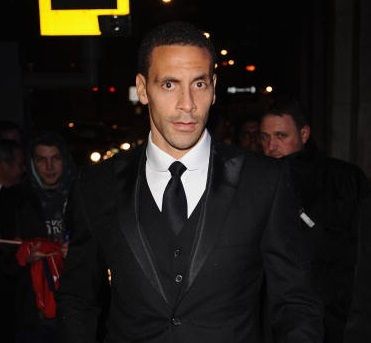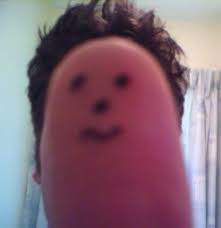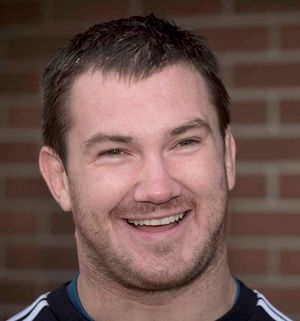Whether it's a pub, singing or doing some charity, Fla believes that players do better if they have an off-field passion too.
I’ve always been a fan of a sports book and over the last few months I’ve found myself reading more and more football ones. As a meticulous professional and fantastic human I have always strived to leave no stone unturned in chasing success. Therefore I thought it would be a wise move to learn more about the mentality and culture within the sport and where better to learn this than through reading ghost-written football autobiographies.
The book I’ve finished most recently is Alex Ferguson’s latest one. I have to say I enjoyed it and strangely found myself identifying with the old guy in a few different areas. The winning of European cups, the winning of leagues, the feeling of being desired everyday whilst all the while being respected and feared in your respective sporting world. Yeah, let’s just say I knew a thing or two about that all right.
However, an area where Alex and I failed to see eye to eye were his views on player interests outside the game. Ferguson was critical of the likes of Rio Ferdinand and David Beckham for their commercial activities off the pitch as he felt it would be detrimental to their football. Ferguson seemed to worry that time spent focusing on these commercial activities would take from the player’s performances and possibly cause them to lose their edge on the field.
Coming from rugby my thoughts on this are quite the opposite. I think the majority of lads who make it in rugby are very driven individuals whose passion for the game borders on obsessive. As a result of this early on in my career I found it very hard to switch off from rugby and almost every thought was consumed with the sport. Whilst passion is crucial, the ability to take a break from the sport is just as important and this was an area in which I really struggled.
I tried golf (didn’t have the patience), surfing (cold and lots of wankers) and I tried studying (a beginners level Spanish course), all to no avail. No, nothing could take my attention from rugby. The knock on effect of this was that my happiness was judged solely on how my rugby was going. This put me in a position where a bad game got replayed over and over in my head or worst of all I’d get injured and now I couldn’t even play the game I loved. On the other side when things were going well I couldn’t help myself but to try and squeeze in extra training sessions as I wanted to capitalize on my good form. This generally led to overtraining and a drop in performance. It wasn’t a very sound approach.
Luckily for me this changed in 2005 when my Dad asked me would I be interested in taking over the family pub on Catherine Street. My initial reaction was that I had no interest as it would just take from my rugby. I’d grown up watching my old man put really long days into the pub and I couldn’t see how that would work with my rugby lifestyle. However, my father and my uncles convinced me that the two could work if set up right, so I decided to give it my best shot.
I was in the pub business. Straight away it drew me in. This was the family business so I felt a strong sense of responsibility not to let anyone down. This wasn’t anything like golf, surfing or a crappy language course. I didn’t have an option of walking away if I got bored and I had to make it work. This was a challenge and it really made me focus on the job. In short it made me switch off from rugby. I now had something else I my life that would need my undivided attention.
I quickly learned to manage my time better and found an instant return. Knowing I didn’t have the option of doing another couple of extra training sessions outside of my prescribed ones with Munster meant I came to each session with a much clearer focus. I would choose what I wanted to work on and I made sure I improved in that area during the session. My training intensity went up and I felt fresher going into each session. This freshness was probably most evident in the mental side of my game as I now had something other than rugby to focus on in between sessions. I went on to have my most successful season to that point, breaking into the national team, winning the Triple Crown and winning our first European cup with Munster.
From then on I made sure that I consistently challenged myself outside of rugby, from getting involved with the set up and running of JOE, to doing a masters in the University of Limerick as I came to the end of my rugby career and now undertaking further studies whilst working at Arsenal. I’m a strong advocate that having a couple of things on the go helps to keep you mentally sharp.
I know luck plays a massive part in success but I genuinely believe that having an outside interest from rugby helped me to become a much better rugby player. Winning a European cup when you’ve just opened a class pub in Limerick was also an excellent move by me on the business front.
 Rio; a busy man
Rio; a busy man
I appreciate that a lot of people will look at the wages that players earn in football and agree with Ferguson that lads like Beckham and Ferdinand should be focused on nothing but football but I disagree. I think for a lot of people having something else that you’re passionate about can really help. Some lads are lucky enough that they can just get out on a golf course and switch off, some like playing music but for some getting trying to help build a business can be their outlet.
Rugby players will also differ from the majority of top footballers as the rugby lads aren’t financially secure enough to not work after retiring from the sport. This is why a lot of the current Irish rugby players utilize their profiles whilst they are still playing to get involved in business prior to retiring. Tommy Bowe has his Lloyd and Pryce shoe line, Jamie Heaslip is a partner in Bear restaurant in Dublin, Brian O’Driscoll is involved in the Ultimate Rugby App, Sean O’Brien and Rory Best love their farming and Paul O’Connell is helping the pay-as-you-go electricity supplier, Pinergy, to build their brand.
The reality is that Paul O’Connell isn’t going around installing electricity meters, Jamie Heaslip isn’t in the restaurant every night making chips and Tommy Bowe isn’t sitting in a factory cobbling shoes up in Monaghan. When they are still playing, the lads main input to the business is to help bring profile so the time requirements are small but all the while they’re learning how the business works and taking a mental break from rugby. Playing professional rugby is undoubtedly a bubble like existence so I think getting a bit of an idea about the economic realities of life through business can help to create more grounded individuals who then appreciate even more how great the lifestyle of a professional sportsperson.
Whilst there is an undoubted commercial aspect to the work the lads above are doing not all players have gone down this route. Donncha O’Callaghan dedicates a huge amount of his time to Unicef as an ambassador and recently
Damien Varley has come out and professed his love of music and the theatre whilst raising awareness for breast cancer research. I’m sure a lot of the public were shocked to see a man like Damien, a tough Munster front row with a face like a thumb and scant regard for his appearance talking about his love of acting and musicals but like I’ve said before its different strokes for different folks and Damien’s recent run of good performances reinforces that.

 Damien Varley on the left, sorry I mean right
Damien Varley on the left, sorry I mean right
I believe that most sports people perform at their best when they have an outside interest to help them switch off. For some it's time with their kids, some like golf, studying or music, some choose charity work but for others the challenge of getting involved in building a business is their outlet of choice.
Without doubt players need to stay mindful of the fact that their sport of choice must always take priority however, just because there is a commercial aspect to their outside interests doesn’t always mean it’s going to be detrimental.



 Rio; a busy man
I appreciate that a lot of people will look at the wages that players earn in football and agree with Ferguson that lads like Beckham and Ferdinand should be focused on nothing but football but I disagree. I think for a lot of people having something else that you’re passionate about can really help. Some lads are lucky enough that they can just get out on a golf course and switch off, some like playing music but for some getting trying to help build a business can be their outlet.
Rugby players will also differ from the majority of top footballers as the rugby lads aren’t financially secure enough to not work after retiring from the sport. This is why a lot of the current Irish rugby players utilize their profiles whilst they are still playing to get involved in business prior to retiring. Tommy Bowe has his Lloyd and Pryce shoe line, Jamie Heaslip is a partner in Bear restaurant in Dublin, Brian O’Driscoll is involved in the Ultimate Rugby App, Sean O’Brien and Rory Best love their farming and Paul O’Connell is helping the pay-as-you-go electricity supplier, Pinergy, to build their brand.
The reality is that Paul O’Connell isn’t going around installing electricity meters, Jamie Heaslip isn’t in the restaurant every night making chips and Tommy Bowe isn’t sitting in a factory cobbling shoes up in Monaghan. When they are still playing, the lads main input to the business is to help bring profile so the time requirements are small but all the while they’re learning how the business works and taking a mental break from rugby. Playing professional rugby is undoubtedly a bubble like existence so I think getting a bit of an idea about the economic realities of life through business can help to create more grounded individuals who then appreciate even more how great the lifestyle of a professional sportsperson.
Whilst there is an undoubted commercial aspect to the work the lads above are doing not all players have gone down this route. Donncha O’Callaghan dedicates a huge amount of his time to Unicef as an ambassador and recently Damien Varley has come out and professed his love of music and the theatre whilst raising awareness for breast cancer research. I’m sure a lot of the public were shocked to see a man like Damien, a tough Munster front row with a face like a thumb and scant regard for his appearance talking about his love of acting and musicals but like I’ve said before its different strokes for different folks and Damien’s recent run of good performances reinforces that.
Rio; a busy man
I appreciate that a lot of people will look at the wages that players earn in football and agree with Ferguson that lads like Beckham and Ferdinand should be focused on nothing but football but I disagree. I think for a lot of people having something else that you’re passionate about can really help. Some lads are lucky enough that they can just get out on a golf course and switch off, some like playing music but for some getting trying to help build a business can be their outlet.
Rugby players will also differ from the majority of top footballers as the rugby lads aren’t financially secure enough to not work after retiring from the sport. This is why a lot of the current Irish rugby players utilize their profiles whilst they are still playing to get involved in business prior to retiring. Tommy Bowe has his Lloyd and Pryce shoe line, Jamie Heaslip is a partner in Bear restaurant in Dublin, Brian O’Driscoll is involved in the Ultimate Rugby App, Sean O’Brien and Rory Best love their farming and Paul O’Connell is helping the pay-as-you-go electricity supplier, Pinergy, to build their brand.
The reality is that Paul O’Connell isn’t going around installing electricity meters, Jamie Heaslip isn’t in the restaurant every night making chips and Tommy Bowe isn’t sitting in a factory cobbling shoes up in Monaghan. When they are still playing, the lads main input to the business is to help bring profile so the time requirements are small but all the while they’re learning how the business works and taking a mental break from rugby. Playing professional rugby is undoubtedly a bubble like existence so I think getting a bit of an idea about the economic realities of life through business can help to create more grounded individuals who then appreciate even more how great the lifestyle of a professional sportsperson.
Whilst there is an undoubted commercial aspect to the work the lads above are doing not all players have gone down this route. Donncha O’Callaghan dedicates a huge amount of his time to Unicef as an ambassador and recently Damien Varley has come out and professed his love of music and the theatre whilst raising awareness for breast cancer research. I’m sure a lot of the public were shocked to see a man like Damien, a tough Munster front row with a face like a thumb and scant regard for his appearance talking about his love of acting and musicals but like I’ve said before its different strokes for different folks and Damien’s recent run of good performances reinforces that.

 Damien Varley on the left, sorry I mean right
I believe that most sports people perform at their best when they have an outside interest to help them switch off. For some it's time with their kids, some like golf, studying or music, some choose charity work but for others the challenge of getting involved in building a business is their outlet of choice.
Without doubt players need to stay mindful of the fact that their sport of choice must always take priority however, just because there is a commercial aspect to their outside interests doesn’t always mean it’s going to be detrimental.
Damien Varley on the left, sorry I mean right
I believe that most sports people perform at their best when they have an outside interest to help them switch off. For some it's time with their kids, some like golf, studying or music, some choose charity work but for others the challenge of getting involved in building a business is their outlet of choice.
Without doubt players need to stay mindful of the fact that their sport of choice must always take priority however, just because there is a commercial aspect to their outside interests doesn’t always mean it’s going to be detrimental.